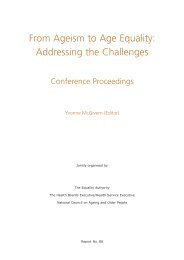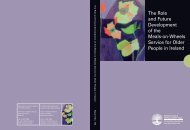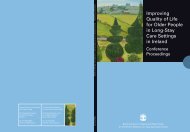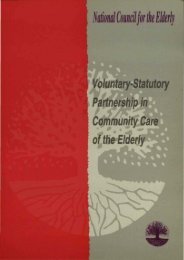Assessment of Older People's Health and Social Care Needs and ...
Assessment of Older People's Health and Social Care Needs and ...
Assessment of Older People's Health and Social Care Needs and ...
- No tags were found...
Create successful ePaper yourself
Turn your PDF publications into a flip-book with our unique Google optimized e-Paper software.
Dependency <strong>and</strong> PlacementThe assessment process should focus on the real needs <strong>of</strong> older people, recognising that dependencyis just one part <strong>of</strong> the process. With regard to dependency, there are a number <strong>of</strong> factors to beconsidered, as outlined below.Common Underst<strong>and</strong>ingsThere is a need for the establishment <strong>of</strong> a common dependency assessment for all types <strong>of</strong> publiclyfundedlong-stay care, or at a minimum, some discussion <strong>of</strong> the assessment <strong>and</strong> dependencymeasures <strong>and</strong> tools currently in use. Within <strong>and</strong> across health boards, there is variation in themeasures <strong>and</strong> tools in use <strong>and</strong>, where there is such wide variation, inequity is inevitable.There is a need for national gUidelines for the measurement <strong>of</strong> dependency or, again at a minimum,some broad agreement as to what is being measured when the dependency <strong>of</strong> older people, includingtheir physical <strong>and</strong> mental dependency, is assessed. This is a need which could be addressed withinthree to six months.People with Low or Medium Dependency<strong>Older</strong> people with low or medium dependency ought to be cared for in an exp<strong>and</strong>ed community caresystem rather than in long-stay care, unless they themselves choose otherwise. However, the mostrecently published statistics on people in long-stay care' show that one in three <strong>of</strong> those are <strong>of</strong> low ormedium dependency. People working with the Nursing Home Subvention Scheme will also knowabout 'dependency creep' through which older peopie are assigned to higher levels <strong>of</strong> dependencysimply to take advantage <strong>of</strong> higher levels <strong>of</strong> subvention. If we are changing the behaviour <strong>of</strong> thoseassessing dependency because <strong>of</strong> funding mechanisms, this is an irrational way <strong>of</strong> allocating olderpeople to care, <strong>of</strong> measuring dependency <strong>and</strong> <strong>of</strong> funding long-stay care <strong>and</strong> it needs to stop.In the context <strong>of</strong> changing the structure <strong>of</strong> the system to enable people <strong>of</strong> low <strong>and</strong> mediumdependency to be cared for within community care settings, we need also to identify <strong>and</strong> address theeconomic <strong>and</strong> social determinants <strong>of</strong> dependency.An Integrated ApproachFor high dependency older people, there should be a guarantee that all possible community carestrategies will be explored before a decision on admission to residential care is taken. This requiresan expansion <strong>of</strong> the community care system, but does not imply the creation <strong>of</strong> a dichotomy betweencommunity <strong>and</strong> institutional long-stay systems.We need one subvention payment for dependency instead <strong>of</strong> the three-tiered payment mechanismcurrently in use, because only seriously dependent people should now be in care.. ;"Public hospital beds should be reserved for those in need <strong>of</strong> intensive nursing care, with significantpublic investment in, <strong>and</strong> development <strong>of</strong>, both rehabilitation <strong>and</strong> step-down facilities for olderpeople, In other words, what is needed is an integrated care system for long-stay care, predicated onthe view that community care is a viable option.Conference Proceedings















